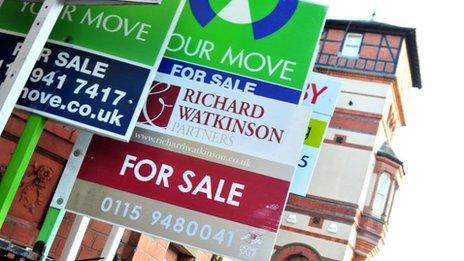UK house prices accelerate, ONS figures show
- Published

House prices have risen in many parts of the UK in recent months
UK house prices in January were up 6.8% compared with a year earlier, official figures show.
This was an acceleration compared with the previous month and was driven by a 13.2% increase in London, the Office for National Statistics (ONS) said, external.
Excluding London and the south east of England, house prices were up 3.8% in the year to the end of January.
Separate figures from the UK's major banks showed that mortgage borrowing was at its highest since August 2008.
The figures, from the British Bankers' Association, external (BBA) showed that there was £11.5bn of gross mortgage borrowing in February, up 47% on the same month last year.
The number of mortgages approved for house purchases was slightly lower than in January, at 47,550, but remained higher than the average of the previous six months of 44,584.
'First timers' concern'
All of this data strengthens the argument that there has been a strong recovery in the housing market since the doldrums of the financial crisis.
However, this will also raise concerns among first-time buyers, who fear that property is getting out of reach, and increase fears of a housing market bubble.
Annually, house prices grew by 7.1% in England, 6.9% in Wales, 1.4% in Scotland and 2.7% in Northern Ireland in January, the ONS said.
Prices paid by first-time buyers were 7.6% higher on average than in January 2013. This was higher than price rises for existing owners. who saw prices increase by 6.5% for the same period, the ONS said.
"The market goes from strength to strength," said Jonathan Harris, director of mortgage broker Anderson Harris.
"Rising property prices are a concern for buyers, particularly first-timers who have saved hard for a modest deposit and are worried about being priced out further. The lack of stock is the main issue and while the Budget emphasised the need to build more homes, they simply can't be built quickly enough."
In the Budget, Chancellor George Osborne confirmed plans to extend the first phase of Help to Buy, which was launched in England last spring, until the end of the decade.
This is aimed at increasing the supply of newly-built homes, with the second phase of the scheme designed to help those with a regular income, but little in savings, to get on the housing ladder.
Given the momentum in the housing market, a group of economists appearing before the Treasury Select Committee said that there was a danger that the Bank of England's tools to stop a housing market bubble could be used too late.
Changing the housing market was a bit like turning an oil tanker, they told MPs during a hearing to study the details of the Budget.
Robert Wood, chief UK economist at Berenberg Bank, Michael Saunders, head of European economics at Citi, and Paul Mortimer-Lee, global head of market economics at BNP Paribas, were giving evidence.